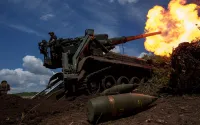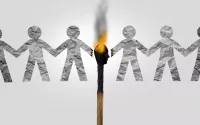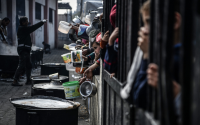
The so-called Sunni Triangle roughly bounded by Ramadi, Samarra and Baghdad has been the centre of the Sunni insurgency.
November saw increased violence across the area as US-led troops embarked on a mission to flush out insurgents, retake rebel areas and stabilise the country before planned elections in January.
The city of Falluja had become a massive security problem since rebels established control following a stand-off in April and the city became a no-go area for the US and its allies.
Hundreds of troops from the British Black Watch Battalion stationed in the southern city of Basra were deployed to the region to free up US marines ahead of an assault on Falluja.
Falluja was subjected to heavy air and ground attacks and US officials say more than 1,000 insurgents were killed and the same number arrested. The number of civilians killed is unknown. Many families fled the city before the assault began but aid agencies have complained of a humanitarian disaster in the city.
US-led troops met stiff resistance but on 18 November, a senior US marine commander said the US-led offensive had "broken the back of the insurgency" across Iraq. Iraqi and US authorities are back in charge of much of the city but are still meeting pockets of resistance.
A spokesman for Prime Minister, Iyad Allawi, conceded many of the rebels had dispersed from Falluja, posing threats elsewhere that US and Iraqi authorities would still have to counter
Violent clashes broke out in other parts of the Sunni heartland during the Falluja assault. US warplanes bombed the city of Baquba, which was the scene of increased violence between rebels and US and Iraqi forces. In Ramadi US forces confronted large groups of gunmen firing rockets and mortars.
Correspondents say the capital is still far from pacified, and insurgents seem to operate all over the city with relative ease.
Anti-government and anti-American fighters use a number of methods. Suicide bombings continue, taking a heavy civilian Iraqi toll.
Mortar attacks on the Green Zone - a heavily fortified area of Baghdad which houses the HQ of the US forces, many foreign diplomats and Iraqi government offices - are a regular occurrence.
Attacks on US convoys and Iraqi officials are also common.
There has been a recent spate of hostage-taking, with attackers targeting foreign businessmen, journalists and aid workers.
Mosul, once seen as a relative success story by the US, descended into lawlessness in November as violence spread from the Sunni triangle to other areas of Iraq. It saw a spate of suicide car bombings against Iraqi and US forces, and a series of co-ordinated assaults by insurgents on the city's police stations.
Hundreds of US troops were diverted from Falluja as US and Iraqi forces tried to re-impose order.
Military commanders said they were concerned by the apparent collapse of the city's police force.
The northern city of Kirkuk has also recently seen a car bombings and sabotage attacks on oil infrastructure in the surrounding area.
The south of the country, controlled by Iraqi government and UK forces, is perhaps the quietest region. However, the violence in Najaf spilled over further south in August.
The roads south from Baghdad to the holy cities of Najaf and Karbala remain extremely dangerous. They cut through the so-called Sunni triangle, which is a scene of daily violence against Iraqi police and national guards.
Security in the Basra has been precarious and a number of British troops have been attacked in and around the city.
Hundreds of British troops are responsible for protecting the oil infrastructure in the area, which comes under regular attack.






